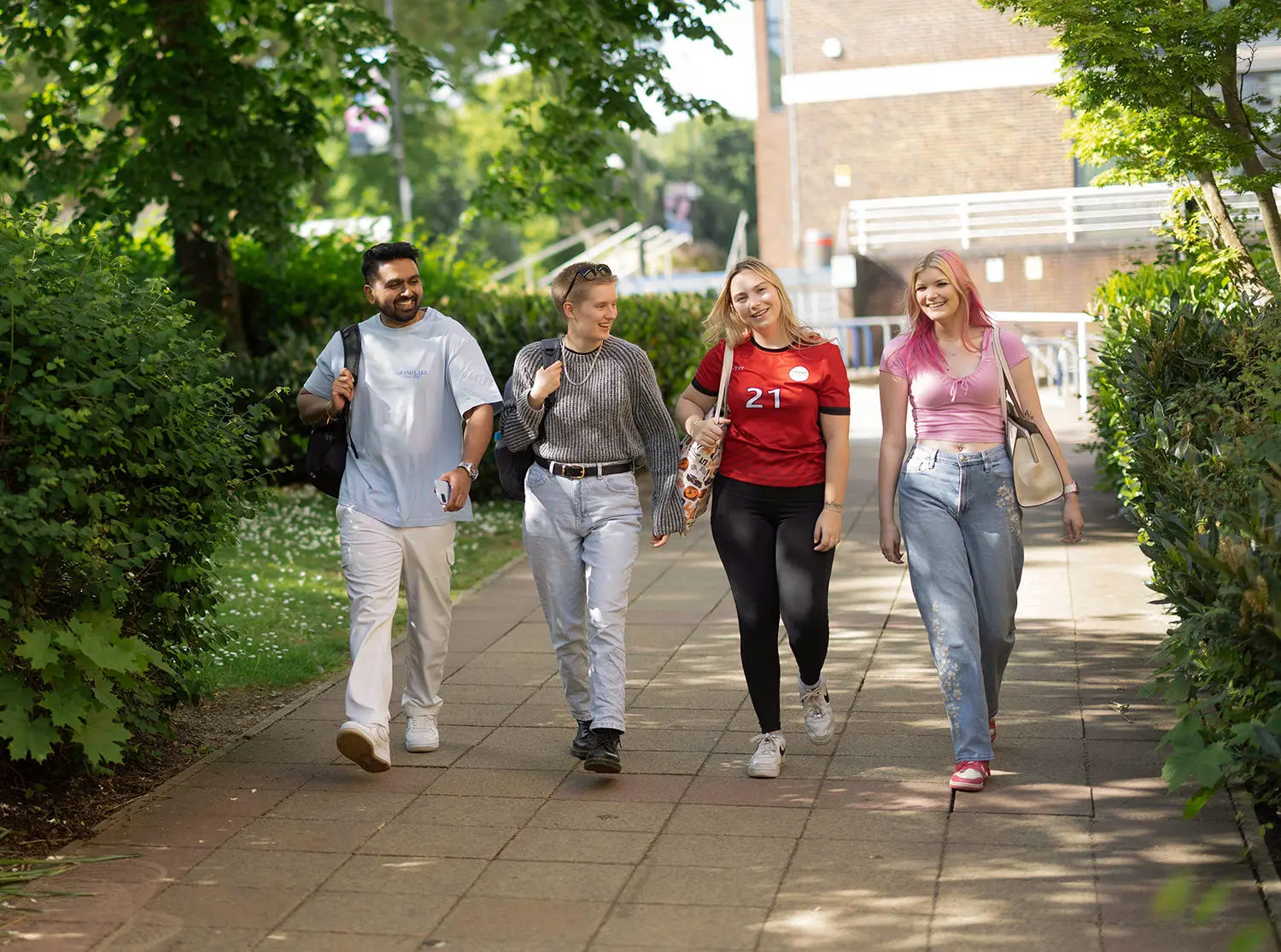
“I feel very lucky to study at Solent University and have always felt valued by the academic team.”


This degree helps you develop critical perspectives on social behaviours, exploring justice, crime and inequality, to prepare you for a successful career and make a meaningful contribution to society.
Contact international admissions
Email: Call:The course is informed by and regularly updated to incorporate current industry thinking, with lecturing staff who have connections and ongoing practice within the sector – ensuring what you study is current, relevant and practically linked to real-world developments and issues.
Throughout the course you’ll develop scientific approaches to researching key issues, applying concepts from sociology and criminology. You’ll also develop a range of key skills which will help you become analytical and enable problem solving. You’ll become an excellent communicator with a good understanding of empathy. These skills will provide useful tools for a range of careers in healthcare, public sector, leadership, law enforcement, finance, research and IT.
This degree emphasises the practical application of criminology and sociology, with real-world assessments integrated throughout. In sociology and criminology modules you’ll reflect on real issues such as community empowerment, justice, and, applied sociology. You’ll also develop knowledge and skills to become competent in critically understanding justice, crime, social issues and equity.
If you’re looking to study our criminology and sociology degree but don’t have the relevant qualifications or experience, the health, sport and social sciences foundation year will help you develop the core skills and knowledge to progress. Find out more about the health, sport and social sciences foundation year.
This course is for students who want to study criminology and sociology developing a excellent knowledge of sociology and criminology that can be applied to their future development and careers.
This degree will give you the skills and knowledge to be able to work in many roles in the voluntary, public and private sector. The skills you learn and develop when you study sociology and criminology can be used in a diverse range of careers.
For example, being a critical thinker and being able to assess different viewpoints, asking critical questions about social issues has meant that employers in a range of sectors see sociology and criminology degrees as desirable.
More specifically, sociology and criminology graduates develop communication skills, analytical skills, and cross-cultural understanding, which can be utilised in a number of employment opportunities.
Hear from Solent alumni about where their careers have taken them and how studying at Solent prepared them for their future.

“I feel very lucky to study at Solent University and have always felt valued by the academic team.”

The University cannot guarantee any particular members of staff will teach specific aspects of the course in the future, but will endeavour to ensure the teaching team maintains their balance of experience and qualifications.
Students have access to our portable crime scene and mock courtroom. You'll also find an extensive range of criminology resources, journals and online materials in the Solent Library.
Our vibrant campus brings state-of-the-art facilities to enhance your learning and elevate your student experience. Our award-winning teaching building, The Spark is centred around students and offers a stimulating study environment with flexible learning spaces. Away from studying, why not try out the gyms, fitness studios and sports halls in our £28 million Sports Complex, or watch a blockbuster film at our student-run cinema with Dolby Atmos audio.
Broaden your horizons by adding an international dimension to your CV – essential to achieving success in today’s fast-changing, global environment.
Studying, working or volunteering in another country could be the experience of a lifetime. Enhance your degree by developing important global skills such as knowledge of other countries, language skills, intercultural awareness, adaptability and confidence.
For more information, please email international.mobility@solent.ac.uk.

This module will introduce you to the discipline of Sociology, enabling you to start becoming sociological. You will start developing your sociological imagination, by being introduced to a range of social theories and concepts that allow you to perceive the world through a sociological lens.
This module introduces you to social inequalities related to gender, ethnicity, class, disability, health, age, nationality, religion, and sexuality by investigating social problems connected to poverty, homelessness, migration, unemployment, youth crime, gang violence, and educational attainment.
This module introduces you to the core concepts, methods and practices used to research urban life. Content covers key themes in urban sociology, including inequality; community dynamics; space and place, and the social impacts of urban change
This module will cover introductions to illegitimate power and legitimate authority; classical and contemporary accounts of power; political power; socio-cultural power; economic power; technological power, and case studies of power and authority.
This module explores the sociological dimensions of death, dying, and killing across cultural, political, and historical contexts. It examines how societies construct meanings around mortality that reflect their death practices; how institutions of healthcare, law, religion and the state regulate death, and how social inequalities shape experiences of dying.
This module aims to develop an understanding of the key concepts of punishment, resistance and desistance with specific reference to comparative criminal justice responses (Britain, Scandinavia and South-East Asia) to offending and research on desistance from crime following the introduction of the 2012 Transforming Rehabilitation Programme in England and Wales.
Working on a live project for an external organisation, you will develop professional research skills, as well as gaining valuable experience working for an employer as part of your degree. You will develop a set of practical research skills that you will use as a real-world sociologist, such as writing a proposal; bidding (pitching) for research; designing the research; writing up field notes, analysing and presenting your research.
This module introduces you to the diverse ways people find meaning, identity and connection through belief and community. While teaching covers key debates in the sociology of religion, secular worldviews, spirituality, ethics, and belonging, the emphasis is on practice-based learning that develops your ability to interpret how beliefs shape everyday life.
This module introduces you to the complex social, political and ethical challenges shaping life in an age of global crisis. While teaching explores key debates around forced migration, displacement, war, climate change, environmental breakdown, and the devaluation of human life, the emphasis is on practice-based learning that develops your ability to critically evaluate real-world problems.
This module critically examines the relationship between crime, gender and sexuality within contemporary society and the criminal justice system. You will learn to apply theory and methods to analyse and solve real-world issues in gender and sexuality within criminal justice and related fields.
This module provides you with the opportunity to work with an organisation that puts people at the heart of what it does in local communities. You will enhance your experience of the world, and your own CV, by directly involving yourself with advocacy, rights and community action.
This module enables students to apply sociological knowledge, theory, and research skills to a real-world project related to students' extra-curricular interests.
Contact international admissions
Email: Call:As part of this course, you will study one module at a time, giving you the chance to build a deeper understanding and see the results of your hard work more quickly. With regular assessments and feedback, rather than exams all at once, you’ll also benefit from improved focus, and a more manageable workload.
Learn more about block teaching
The student achievement team are on hand to help you succeed during your studies at Solent. They aim to contact you at key times during your time here with personalised information, advice and guidance, by email or phone.
The disability advice team provides information, advice and guidance for disabled students.
All students can access Succeed@Solent, Solent's online guide to getting better grades. It offers extensive, practical information and advice on topics such as academic writing, research and presentations.

The combination of criminology and sociology can provide you with a wide range of skills to work in rewarding roles in sectors such as criminal justice, social work, youth work, and the civil service.
Connections to the industry during your degree are made through several avenues, including guest speakers and the professional connections of teaching staff. The course also has a close working relationship with relevant local and national employers, such as Hampshire Constabulary, National Probation Service, Portsmouth Adult Social Care, Portsmouth drug addiction charity, National Crime Agency, New Jersey Police Department and the Office of the Policing Commissioning.
Past guest speakers have included professionals who work within public health, police, probation, cybersecurity, military, charity sector and victims support services.

Starting salary (in training): £22,294
Once you've completed your training (which can take 15 or 21 months, depending on your qualifications) your salary will rise to £30,208, plus allowances. You'll also receive a range of Civil Service benefits.
Starting salary: £18,000 to £24,000
Senior PR officers usually earn in the region of £25,000 to £40,000.
Youth support worker: £19,308 to £28,787
Qualified professional youth workers can earn between £25,313 to £42,718. Salaries for local authority youth service managers vary according to the size of the authority and responsibility of the post, but can be in excess of £40,000.
The stated salaries are published on prospects.ac.uk. Income figures are intended as a guide only.
Hear from Solent alumni about where their careers have taken them and how studying at Solent prepared them for their future.

“I feel very lucky to study at Solent University and have always felt valued by the academic team.”

The Solent Careers team is committed to getting students into great careers.
While you are studying, the team can help you with finding work experience or placements, link you with a mentor, check your CV, or offer one-to-one guidance.
We also have graduate job opportunities just for Solent graduates.

6th
UK uni for sustained employment
Longitudinal Educational Outcomes, 2022
Every student at Solent University will also have the option to study an additional Certificate in Practical Artificial Intelligence qualification alongside their course. Free of charge, the course ensures you'll be prepared for a fantastic and varied career after graduation.

Thinking about studying further than an undergraduate degree? Alumni can get 20% off their postgraduate study.

Embark on your journey to becoming a solicitor with full SQE 1 and 2 preparation.
Find out moreThe tuition fees for the 2026/27 academic year are:
For further information, please visit our tuition fees page.
While most course costs are covered by your tuition fees, some essential resources and optional extras may need to be paid for separately. For advice on budgeting and managing your money, please contact student.funding@solent.ac.uk.
Solent University offers a range of bursaries and scholarships that provide financial assistance or waive fees for tuition or accommodation. Each bursary or scholarship has specific eligibility criteria. Check out our bursaries and scholarships pages to find out more.
Cost of living support
At Solent, we understand that the cost of living crisis may be of some concern. To help, we've put together some detailed information to show what support is available and how to make your money go further.
Graduation costs
There is no charge to attend graduation, but you will be required to pay for the rental of your academic gown (approximately £45 per graduate, depending on your award). You may also wish to purchase official photography packages, which range in price from £15 to £200+. Graduation is not compulsory, so if you prefer to have your award sent to you, there is no cost. Extra guest tickets will go on sale after results publication and will be sold on a first-come-first-served basis. The cost per ticket is currently £20. Please note, we do not guarantee there will be any extra tickets available to purchase.
Contact international admissions
Email: Call:Please select an option below:
As a general guide, we look for qualifications that are equivalent to the British high school A-levels.
If you are applying from outside the UK, find information about entry requirements, visas and agents for your country here.
For further information about EU qualifications, please see our course entry requirements document.
As a general guide, we look for qualifications that are equivalent to the British high school A-levels.
If you are applying from outside the UK, find information about entry requirements, visas and agents for your country here.
For further information about international qualifications, please see our course entry requirements document.
All international applicants need to be aware that the English language requirements to attend Solent University, and the English language requirements to obtain a visa from the Home Office, may be different. This means that if you meet the Solent University language requirement to gain a place on the course, you may still have to meet additional requirements to be granted with a visa by the Home Office.
We strongly advise all applicants to visit the Home Office website which outlines all the requirements for a successful visa application.
Full-time
Any student applying for the first year of a full-time/sandwich undergraduate course must apply through UCAS (University and Colleges Admissions Service). This includes mature, overseas and EU students.
Nearly all schools and colleges offer their students the facility of applying electronically through the UCAS website using 'Apply'; it may also be used by those applying independently in the UK and overseas. This facility and all course information can be found on the UCAS website: www.ucas.com.
Your application should reach UCAS by 14 January if you hope to enter a course the following autumn. Early application is advised for the most popular subject areas. Late applications may be made until the end of June. The UCAS Code for the University is S30, code name SOLNT.
Find out what happens after you apply
Contextual offers
Solent endeavours to offer learning opportunities to students from all backgrounds. When we receive and review an application, we take into consideration the context and personal circumstances of applicants when making a decision, which means our advertised entry tariff could be reduced.
Find out more about Solent's contextual offers
Applicants who do not have English as their first language will be required to demonstrate an approved level of proficiency in the use of the English language. The agreed minimum requirements for this course are:
TOEFL IBT tests taken prior to 21 January 2026
TOEFL IBT tests taken from 21 January 2026
Qualifications are checked before enrolment, and international students must bring their original certificates or certified copies when coming to study at the University.
Pre-Sessional English programme
The University also offers a pre-sessional English programme for international students who wish to improve their level of English before starting a degree course.
Contact international admissions
Email: Call: